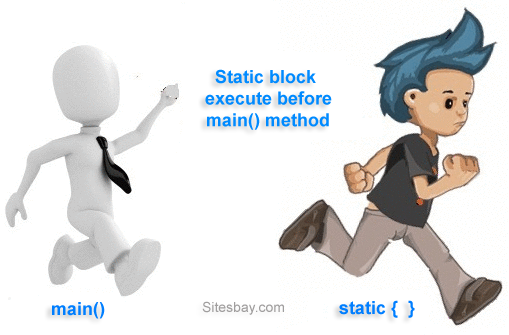Static Block in Java
Static Block in Java
Static block is a set of statements, which will be executed by the JVM before execution of main method.
At the time of class loading if we want to perform any activity we have to define that activity inside static block because this block execute at the time of class loading.
In a class we can take any number of static block but all these blocks will be execute from top to bottom.

Syntax
static
{
........
//Set of Statements
........
}
Note: In real time application static block can be used whenever we want to execute any instructions or statements before execution of main method.
Example of Static Block
class StaticDemo
{
static
{
System.out.println("Hello how are u ?");
}
public static void main(String args[])
{
System.out.println("This is main()");
}
}
Output
Hello how are u ? This is main()
Run java program without main method
class StaticDemo
{
static
{
System.out.println("Hello how are u ?");
}
}
Output
Output: Hello how are u ? Exception is thread "main" java.lang.no-suchmethodError:Main
Note: "Exception is thread "main" java.lang.no-suchmethodError:Main" warning is given in java 1.7 and its above versions
More than one static block in a program
class StaticDemo
{
static
{
System.out.println("First static block");
}
static
{
System.out.println("Second Static block");
}
public static void main(String args[])
{
System.out.println("This is main()");
}
}
Output
Output: First static block Second static block This is main()
Note: "Here static block run according to there order (sequence by) from top to bottom.
Why a static block executes before the main method ?
A class has to be loaded in main memory before we start using it. Static block is executed during class loading. This is the reason why a static block executes before the main method.

